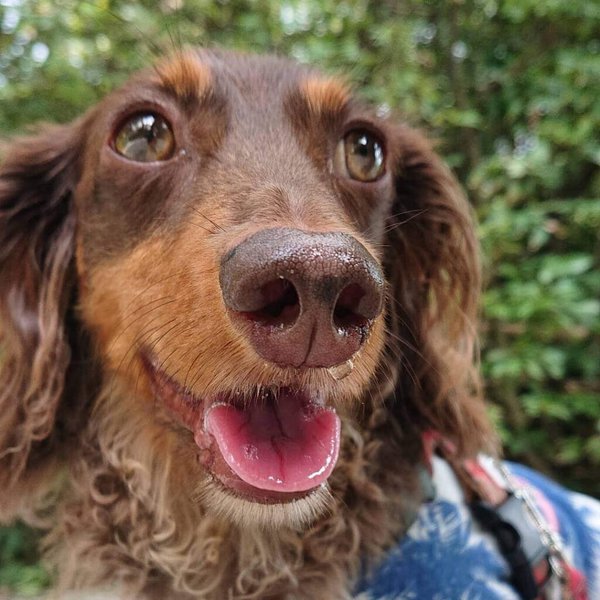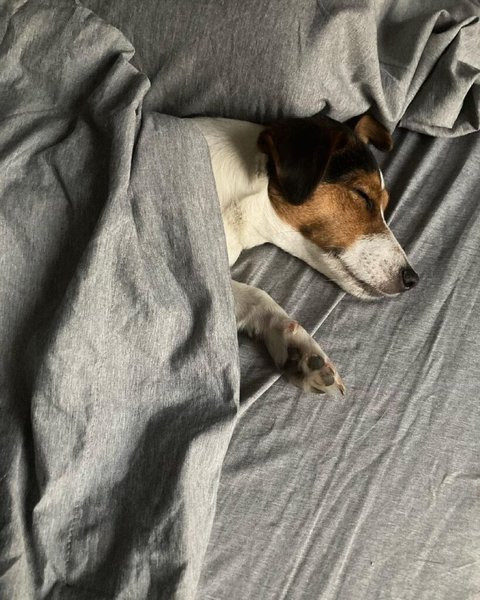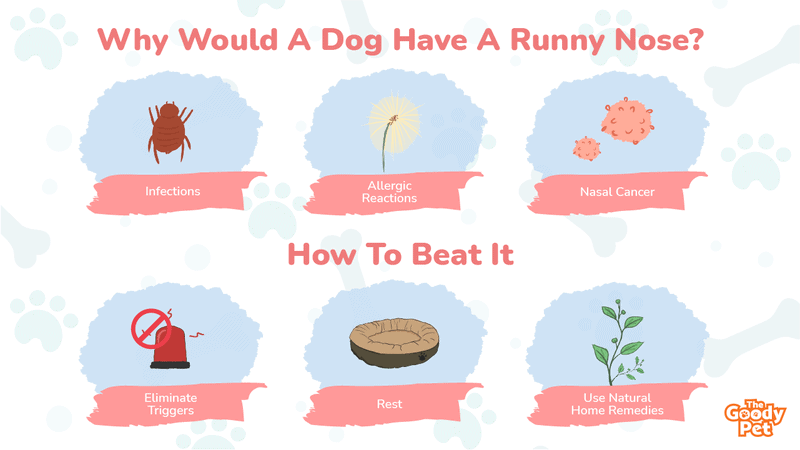Dogs, just like humans, can get sniffles. And while runny noses in dogs are typically an indicator of your pup’s excitement, it can be an indicator of a canine flu pandemic. So, what should you do if your dog has a runny nose?
Caring for a dog with a runny nose includes booking an immediate appointment with the vet for proper diagnosis, eliminating allergic triggers, and in case of a bacterial or viral infection, usage of the appropriate medication.
In today’s article, we’ll be taking a look at signs that your pooch is down with the flu, how to cater to a sick dog at home, and things to steer clear off when your canine is down with a cold. However, before we go into the treatment of runny noses in dogs, let’s take a look at the common causes of nasal discharge in pooches.
Why Would A Dog Have A Runny Nose?
Some of the most common reasons for nasal discharge in pooches include:
Allergic Reactions
Dogs, like humans, are allergic to a variety of substances such as pollens, food, drugs, and mites. And one of the most common reactions to these allergens in pooches is a runny nose with a thin, colorless discharge.
If you had no previous knowledge of your canine’s allergies, you’d need to consult a vet to run an allergy test. Once you know what’s causing the allergic reaction in your pooch, you can then eliminate such triggers to give your furry friend some reprieve.
Infections
Dogs can catch bacterial, viral or fungal infections with symptoms similar to that of the human cold. And some of the common symptoms of a cold-causing infection in pooches include a runny nose, occasional sneezing, and watery eyes, among others.
A dog cold will typically last for around one week and, with proper home care, will go away on its own without you needing to visit the vet.
Irritants In The Nose
Other times, the reason for a runny nose in your canine could be due to the presence of a foreign object such as grass or a tiny stick in its nose. Nasal discharge in pooches caused by an irritant in the nose is typically accompanied by sneezing and pawing at the nose in an attempt to remove the object.
Nasal Cancer
In more extreme and rare cases, a runny nose in a pooch could be an indicator of a serious condition such as Nasal Cancer. In cases of nasal cases, a runny nose is typically accompanied by more severe symptoms such as excessive sneezing, a bloody nose, and swelling in the face, among others.
And immediately you notice one or more of these symptoms, you should take your dear Fido to the vet for proper diagnosis and treatment.
Other Causes Of Runny Noses In Dogs
Apart from the conditions listed above, nasal discharge in pooches could also mean that your dog is suffering from kennel cough, nasal mites, gingivitis, and abscessed teeth.

What Are The Signs Of Dog Flu?
Dog flu (also known as the canine influenza virus), according to the American Kennel Club, is an infectious respiratory tract disease caused by specific Type-A H3N8 or H3N2 influenza viruses that affect only dogs.
How Can Your Dog Catch The Flu?
Due to its airborne transmission, canine influenza is highly infectious, and your pooch needs only the slightest bit of contact with an infected doggie to catch the flu.
Dogs can also catch the flu when they come in contact with contaminated objects such as collars, food and water bowls, or even through people that have been around infected doggies.
During a canine flu outbreak, all dog breeds are susceptible to infection. However, due to their often overcrowding environments, doggies housed in kennels and shelters are at a higher risk of catching the flu.
How Do You Know If Your Dog Has The Flu?
Symptoms of canine influenza in pooches are quite similar to what humans experience when they go down with the flu, and they include:
- Runny noses
- Sneezing
- Moist or dry coughing
- Reduced appetite
- Tiredness
In more severe cases of canine flu, you will notice your dog shaking from high fever and gasping due to breathing difficulties; These are symptoms of pneumonia, and if left untreated, it can prove to be fatal for your furry friend.
If you’ve noticed all of the above symptoms in your pooch, and you want to be doubly sure your furry friend is suffering from canine influenza, you can visit your vet to test for dog flu.

How Can I Treat My Dog’s Cold At Home?
In most cases, dog flu is a fairly mild condition. And by treating your pooch with simple home remedies and putting the necessary things in place, your furry friend will be up and running in no time.
That said, some of the things you should take into consideration when treating your dog’s cold at home include:
Ensure Your Dog Stays Hydrated
It is essential for dogs suffering from colds to having a regular supply of fresh, clean water as this typically speeds up the recovery process. Water makes mucus thinner, thereby helping to prevent a stuffy nose, and also helps regulate your pooch’s body temperature.
If your pooch is reluctant to drink, you can mix low-sodium chicken or beef broth with the water to serve as an encouragement to drink.
Diet
Dogs suffering from a cold require warm, moist meals to help them fight off the cold. Chicken is great for sick pups, and you can give a cold dog chicken soup, shredded chicken, or beef broth. Fruits and vegetables are great sources of vitamins, and you can incorporate them into your pup’s diet.
Rest
A sick pooch will spend most of the time resting, and it is your duty as a dog parent to ensure that your furry friend is as comfortable as possible when sleeping.
The provision of a warm resting location with heated sleeping beds and blankets will go a long way in relieving a cold dog. But you should regularly keep an eye on your pooch to ensure it doesn’t overheat.
Keep The Air Moist
Dogs suffering from colds might have difficulties breathing, and to make air intake easier for your furry friend, you should ensure the air in your home is not too dry. And you can do this by setting up a cool mist humidifier in strategic places in the home – where your dog sleeps or where its food and water bowls are located.
As an alternative to the humidifier, you can pour boiled water into a bowl and place it where your pooch can inhale the steam.
Medication
Upon consulting your vet, you will find that it can be beneficial to give a pooch medicine, such as Benadryl, as a treatment for a runny nose, sneezing, and a cold. Benadryl, when administered in the appropriate dosage, is a highly effective and safe medication typically used to treat symptoms of mild allergies in dogs.
If your pooch has an underlying health condition, however, you should consult with your vet before giving it Benadryl. Additionally, you should know that Benadryl can cause side effects like drowsiness, dry mouth, excessive salivation, and rapid breathing in pooches.
NOTE! After you have treated your dog’s cold at home, should your dog’s cold persist or display other symptoms, visit the vet immediately for a proper diagnosis. Your pooch may be suffering from another illness other than a regular cold.

How Can I Treat My Dog’s Allergies At Home?
Rather than pump your pooch full of medications, home care for canines suffering from mild allergies is possible and, more often than not, highly effective. Here’s how to cater to a dog with a runny nose from an allergic reaction:
Identify The Source Of The Reaction
The first thing to do when you notice your pooch suffering from an allergic reaction is to try and determine the trigger. Common causes of allergies in dogs include food, fleas, plant and animal fibres, mold, dust mites, and many more. In some cases, it is possible for your pooch to react to two or more of these substances at once!
Finding an allergic trigger can be particularly difficult to do if you have no prior knowledge of your pooch’s allergies. Therefore, you should consult your vet for a thorough examination of your furry friend when you notice symptoms of an allergic reaction like a runny nose.
Eliminate Triggers
Once you’ve discovered the cause of allergic reactions in your pooch, the next logical thing to do is to minimize your canine’s exposure to such items or, where possible, get rid of them completely. Reduce your pooch’s contact with moist or damp areas where mold typically grows and clean areas that tend to collect dust.
Vacuum cleaning your home at least once a week with the iRobot Roomba i3+ will also help in reducing your pooch’s allergic reactions.
The iRobot cleaner boasts a functional AllergenLock bag that effectively captures and holds pollen and mold that are culpable for causing reactions like runny noses in pooches.
Keep The Air Clear And Moist
Dogs suffering from allergic reactions might experience difficulty breathing, and to combat this, it is imperative that you keep the air in your home moist to relieve cold and allergy symptoms like runny noses.
Humidifiers such as the Homasy Humidifier Diffuser with 7-Color Night Lights carry out this process perfectly and are good for dogs.
The Homasy Humidifier helps keep indoor air at an acceptable level of relative humidity between 40% to 60%, and leaving it on all night will help your dog breathe and sleep better.
Add Supplements To Your Dog’s Diet
Food and water supplements are particularly effective at suppressing the effects of allergic reactions in dogs. And incorporating supplements like the Zetsy Paws Allergy Immune Supplement for dogs in a sick pooch’s diet will aid in getting over reactions much faster by giving the doggie’s immune system a boost.
Use Natural Home Remedies
In addition to supplements, there are several natural home remedies you can give a pooch suffering from an allergic reaction to ease the effects of the symptoms.
Ingredients like Aloe Vera gel, coconut oil, oatmeal baths, thyme, and mullein leaves are particularly effective when combating allergies in dogs.
Things To Avoid Doing To Your Dog If He Has A Cold
How Much Benadryl Is Okay For Your Dog?
We’ve earlier spoken about how Benadryl can be effective in treating a canine with a cold, but at the same time, an overdose of Benadryl can kill a dog!
How much Benadryl you can give a dog depends on its weight, but the acceptable dosage is usually 1 to 2 mg per pound, at most, three times a day. Anything above this will result in Benadryl poisoning, which can be fatal for pooches.
Should You Put Vicks On Your Dog?
We’ve spoken about the possible harmful effects of Benadryl on dogs, but another common household product that you should limit your furry friend’s exposure to is the Vicks VapoRub.
VapoRub is typically used to treat coughs and blocked nostrils in humans, but it is not the best substance to put on a dog.
For one, Vicks contains camphor, which is toxic to dogs. And when your dog licks the VapoRub you’ve applied to its body in the hopes of curing its cold, it can result in topical camphor poisoning, which causes diarrhea, vomiting, nausea, and burning of the throat.
Thankfully, none of these symptoms will kill a dog, and with prompt medical attention, your pooch will be fine.
Change Your Walking Routine
If your dog’s cold is a result of an allergic reaction to plant or tree pollen, then it’s probably best you avoid walking your pooch in the morning or late in the afternoon, when there’s usually more pollen in the air.

Related Questions
Can Your Dog Catch The Flu From You? It is not possible for a pooch to catch the human flu in the same way that it is impossible for humans to suffer canine flu. However, if you’ve recently come in contact with a dog suffering from canine flu, there is every tendency for you to carry the virus on your clothes or skin and pass it across to your canine.
What To Feed Dogs When They Are Sick? Sick dogs typically require a diet that is low in fat and can be easily digested. And good examples of foods to feed sick dogs can include bland boiled chicken, baby food, and boiled rice. Also, with all the attention mostly on solid food, you shouldn’t forget to give your pooch water to keep it hydrated.
How Do You Comfort A Sick Dog? There are several ways to comfort a sick dog, and these include:
- Providing a warm, snuggly spot for your pooch to lay.
- Keeping your sick canine hydrated.
- Staying calm around your furry friend.
- Not forcing it to feed.
- Cleaning up your sick pooch if it soils itself with feces or urine.





